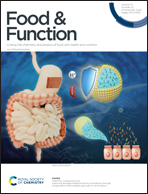Enzymatic modification of d-mannose alleviates DSS-induced colonic inflammation in mice through macrophage polarization mediated by PPARγ†
Abstract
As a dietary supplement, supraphysiological levels of D-mannose have been proven to attenuate colitis via administration of 20% (w/v) D-mannose given in drinking water or by oral gavage. However, we observed that a lower dosage of 2% (w/v) D-mannose had no significant beneficial effect on colitis. Herein, enzymatic modification of mannose (phosphatidylmannoside, PtdMan) via phospholipase D catalyzed transphosphatidylation is proposed as a way to enhance the modulatory effect of mannose on colitis. We firstly demonstrated that phosphatidylmannoside showed a better preventive effect to alleviate the symptoms of colitis than D-mannose, as evidenced by higher body weight, lower disease activity index scores, and improvement of colonic pathological damage in vivo. Furthermore, our data highlight that PtdMan significantly attenuated pro-inflammatory cytokine levels in the colons of DSS-colitis mice and lipopolysaccharide (LPS)-stimulated RAW 264.7 cells, and modulated M1/M2 polarization via PPARγ activation. Concomitantly, in comparison with mice treated with D-mannose, the PtdMan treatment regimen showed therapeutic efficacy against colitis after 5 days of DSS induction. In summary, PtdMan showed the potential to reduce inflammation and ameliorate intestinal damage in DSS-induced colitis. These results indicate that PtdMan attenuates DSS-induced colitis and LPS-induced inflammation, and the mechanism behind the phenomenon may be regulating macrophage polarization. Our study provides a theoretical basis for phosphatidylmannoside to be used as a potential candidate for the treatment of colitis.



 Please wait while we load your content...
Please wait while we load your content...